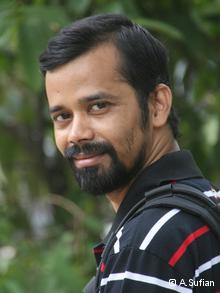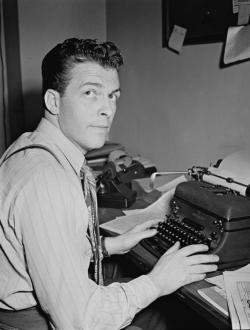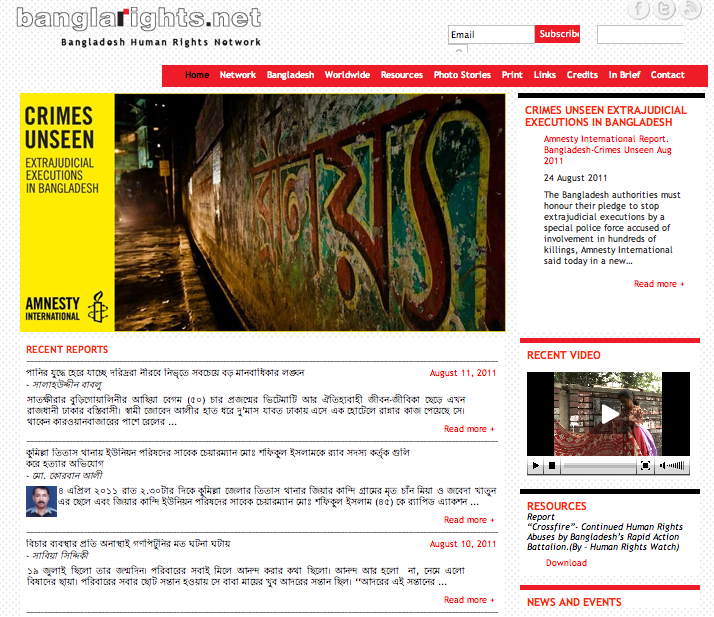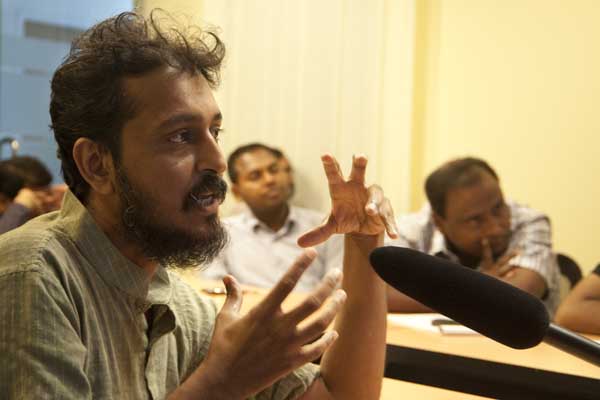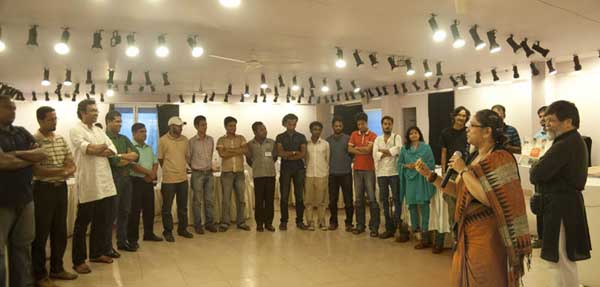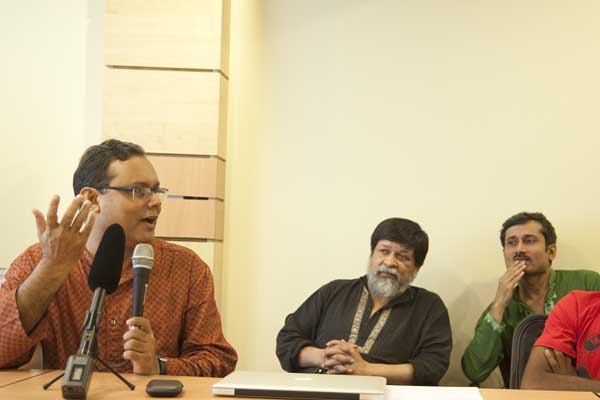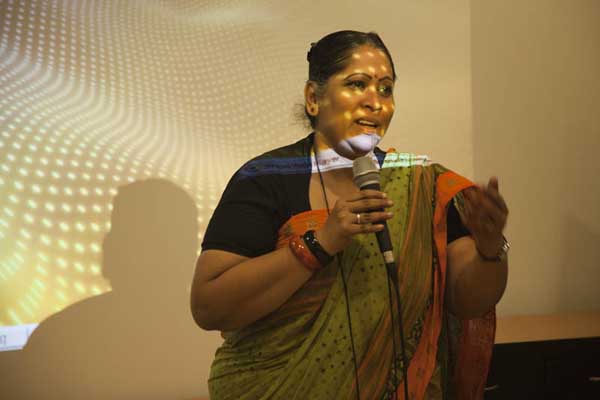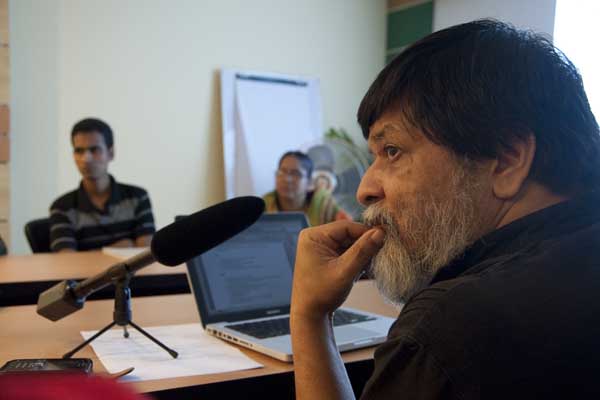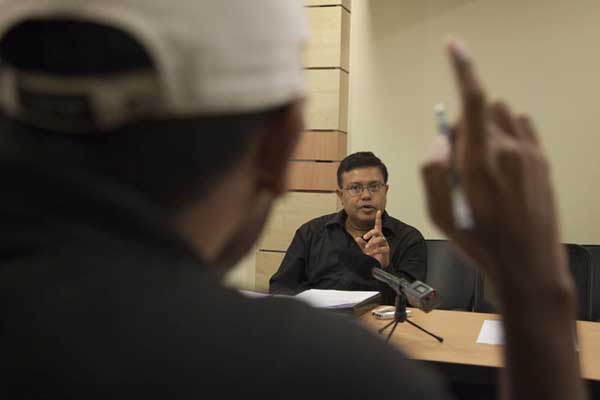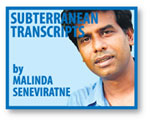By Gypsy Bohemia
A solitary lamp perched on a desk top lights a room. A man scribbles feverishly on paper, hunched over the light as if he?s jealously guarding what little he has. His desk is cluttered with cartoons and drawings ? some of a President, others of two small children. He holds down his paper with one hand and writes with the other, so violently that other loose papers and articles shuffle with his movements.
He is breathing hard, as if he?s run to his desk from sleep, taken by wild inspiration. He has forgotten to switch on the fan, and the heat of that December night hangs in the air, thickening like spoiling milk. Small explosions of sweat begin to burst from the pores of his forehead, drip darkly onto his fast-moving hand, and trickle onto the paper, blotting the ink. This frustrates him but he doesn?t stop to soak up the liquid, just writes on, faster.
His wife lies in bed in the next room. She is awake, some inexplicable worry vaulting the sleep away from her eyes whenever it threatens to close them. She watches the empty space next to her, willing her husband to come back to bed but knows he won?t. She wonders what he felt the need to write about in the middle of the night, leaping out of bed as if possessed. She was afraid he?d knock something over in the dark and wake the children, but that walk from bedroom to desk is so familiar that he doesn?t.
It is only when he feels that familiar cramping in his fingers that he pauses. He looks around the room, fighting to make out familiar shapes in the blackness outside his little circle of light. His house is modest and unadorned for the most part ? the only exceptions are the sketches of his children that he has been drawing since they were born. Some have been framed; others lie strewn around the house ? on bits of furniture, stuffed carelessly into vases by the children, folded within the pockets of well-worn wallets, dog-eared between the pages of story books.
He wiggles his fingers to give them a stretch and picks up one of the drawings on his desk. His little boy is growing up quickly and sometimes he feels like he?s missing it, so caught up is he in his work. Sometimes he sees print in his sleep. Sometimes he finds himself talking to his little ones about his work and has to stop mid-sentence, realizing they don?t understand most of what he?s saying. He shoots a guilty glance in the direction of his bedroom, knowing he woke his wife in his mad midnight rush to get to his desk. She worries for him, he knows. He doesn?t take enough time to relieve her of those worries, to comfort her. He resolves to, as soon as he finishes this article.
After this brief pause, he goes back to his article, crossing and re-crossing the lines, scribbling out careless mistakes, cursing his own pen which writes far slower than the thoughts run in his head. He longs for the computer at his office but knows it is too late to go there now and besides, to leave now would be to disrupt the flow of his writing. The flow in tonight?s case is a torrential storm of words, figures and damning evidence.
His wife gives up a losing battle and comes to the doorway of the bedroom, which is always open ? just in case. She leans against the frame, appreciating the cool wood against her hot skin, and watches her husband as he works. She knows every telltale movement of his obsessive inspiration so well. Watching him from behind, he looks the same as he did when they first married. He would stop every now and then to shuffle through printed sheets of information and look up to stare unseeingly at some point on the wall, piecing parts of it together in his head. His back would periodically straighten and then fall into that characteristic hunch every time he was struck by something new that he simply had to write down. Even through the dull ache of worry in her stomach, she can?t help but smile.
She knows the value of what he does, but it isn?t the easiest thing to live with. The warnings, the childrens? questions, her own engulfing fear. When they came with ropes and iron rods to take him away she expected that fear to kill her on the spot. It stuck in her throat and seemed to expand outwards, threatening to burst vocal chords already strained with soundless screams. There was an awful moment before he was dragged away, when she looked from her husband?s eyes, smoldering with helpless anger, to the terrified ones of her children. Seconds later, she caught sight of her own in a mirror and saw only naked panic. 4 pairs of eyes, a thousand different emotions. Darting urgently from one to the other, trying to comprehend, trying to rebel, trying to say goodbye. Moments later, he was gone and they were alone.
When he came back, she couldn?t believe it. She wildly kissed each purpling eye, each ugly bruise and held him tightly against her, not caring even as he cried out in pain when her arms circled sensitive, injured skin. She tried to make him swear never to put himself in danger again. For her. For their children. He refused. The truth is more important, he kept insisting, and his eyes suddenly became distant and withdrawn and she knew he was already thinking of something to write. At that moment she felt a mixture of searing frustration and aching love so strong, she almost choked.
Today, as she watches him write, she feels a similar emotion. She looks down the hall to her children?s shared room, listening in the stillness for any indication that they?re awake. Her little girl has been having nightmares of late. She never says what they?re about, but insists on crawling into bed with them for the rest of the night. She only falls asleep when her head is nestled safely against her father?s chest.
He?s been writing so hard and so long, he doesn?t notice she is standing behind him. Suddenly though, in a rare lapse of concentration, he feels the pressure of her stare on his back and the weight of her worry cloaking his skin ? another layer of heat on an already hot night. He turns around and looks for her in the darkness, finding her barely visible in the shadows of their bedroom doorway.
?Come to bed? she says quietly and her eyes linger on him for a moment or two before she turns to go back inside.
He looks at his unfinished article for a moment, hesitating. Then he wonders how many times he will get to hold her after this article comes out. He lives under no illusions ? they came before. They will come again.
He puts down his pen as if putting down a heavy weight. The truth can wait for a few hours, he thinks. The truth can wait until morning.
He gets up, switches off the lamp, and as the room dissolves into darkness around him, walks that familiar path back to bed.
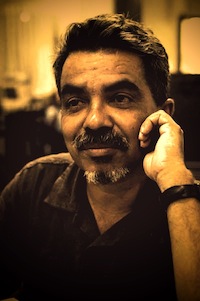
Authors note: Journalist and cartoonist Prageeth Ekneligoda went missing on the 24th of December, days after writing several critical articles regarding election malpractices by the Government. He remains missing to this day. Like him, hordes of journalists have been arrested, abducted, jailed, tortured and murdered for reporting the truth and expressing dissenting views. Some have been returned to their families. Others, like Ekaneligoda, have simply vanished without a trace, leaving their families with the horror of not knowing whether to hope or grieve.
These attacks are not simply hits against the media. They are a direct violation of our rights: the right to know the truth of what is out there, the right to ask questions of those who should answer to us, and the right to simply have a different point of view.
For every voice that is silenced, more must shoulder their burden, wear their courage and take their place to end this cycle of insidious violence. This is my tribute, for The Missing.

